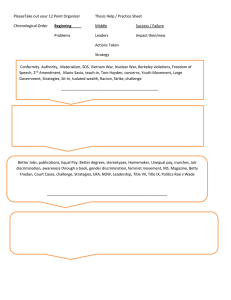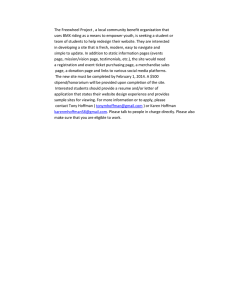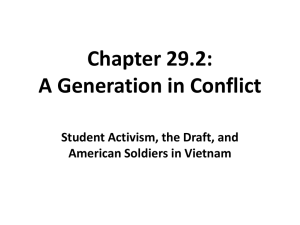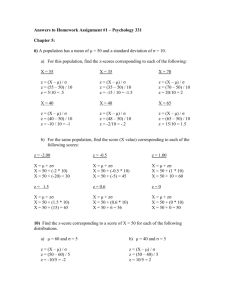1960s Cultural Upheaval: Vietnam, Civil Rights, Counterculture
advertisement
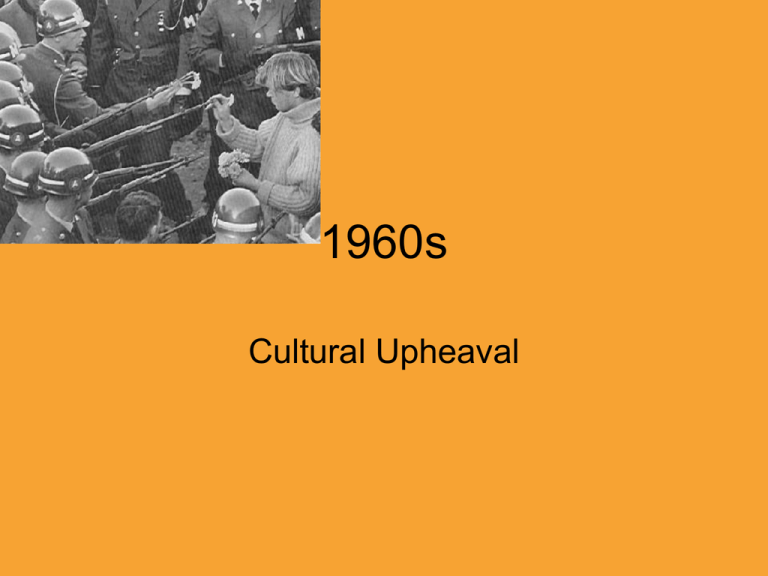
1960s Cultural Upheaval Review • What was the Supreme Court case that ended segregation in schools? • A = Brown v. Board of Education • What law ended segregation in everything else? • A = Civil Rights Act of 1964. • Name 4 Civil Rights organizations. • A = NAACP, CORE, SNCC, SCLC • CORE led what Civil Rights activity? • A = Freedom Riders • What was “Freedom Summer”? • A = 1964-College students from the North went to the South to register blacks to vote. • Who was Stokely Carmichael? • A = 2nd leader of SNCC. He coined the term “Black Power.” • Who was Malcolm X? • A = He was a leading figure in the Nation of Islam who said whites were the devil. • How did Carmichael and Malcolm X differ from Martin Luther King in their view on how to achieve civil rights? • A = Carmichael and King advocated violence. • What militant black organization was founded in Oakland in 1966? • A = The Black Panthers. • What Supreme Court case set the precedent of Judicial Review? • A = Marbury v. Madison • What is Judicial Review? • A = That the Supreme Court can decide on whether laws passed by congress are acceptable according to the constitution. Issues • War in Vietnam • Civil Rights • Counter culture Counter Culture • “Hippies” People that reject traditional values (“the establishment”). • Long hair/different clothes • Drug use (pot and LSD) • Rejection of mainstream ideals of sexuality (availability of birth control). • Eastern religion and communes. • Change in music Impact of Counterculture • Health Food Stores • Fashion • Music Summer of Love If you're going to San Francisco, be sure to wear some flowers in your hair... If you're going to San Francisco, You're gonna meet some gentle people there. Lyrics by the Mamas and the Popas • Hippies from all over the U.S. go to San Francisco in 1967. • Over 100,000. • Most go to Haight-Ashbury Reasons for Counterculture • Disillusionment – A. Civil rights – B. Vietnam – C. Materialism of mainstream culture. Blame elders for creating these problems. Creates a “Generation Gap” –-Difference in attitudes between generations. War in Vietnam • Opposition starts slowly. • 1st on College Campuses: – A. Teach Ins – B. Student Activism—Sit Ins • As war goes on, opposition grows. Student Activism • College attendance was at an all-time high (Baby Boomers coming of age and affluence of society) • Many students were politically active over Civil Rights struggle. • AS U.S. involvement in Vietnam escalated, Students began to protest the war more. Free Speech Movement • Berkeley, 1964. • Campus Officials ban on campus recruiting for off campus organizations. • Students respond with protests. • Led by Mario Savio & Called “The Berkeley Free Speech Movement.” Students for A Democratic Society • SDS • Radical Student group founded at University of Michigan. • Formed the Core of the “New Left” (radicals who believed that traditional liberals could not solve the problems of racism, poverty, and the war). • Spread to other campuses. Port Huron Statement • Written by SDS leader Tom Hayden. • New Left manifesto that called for the individuals to regain control over a society controlled by massive government and corporate bureaucracies. The Weatherman • SDS eventually splits over the issue of violence. • The most radical—those that are OK with violence—are called the “weathermen.” • Name come from Bob Dylan’s “Subterranean Homesick Blues.” • Carry out bombings that don’t kill anyone. “Yippies” • Youth International Party. • Anarchist political group. • Led by Abbie Hoffman. • Tried for inciting riot at 1968 Democratic National Convention. Society Divides over the War • Regular people begin to join the students against the war. • Causes divisions between “Hawks & Doves.” • Mostly a generational division (Generation Gap). The Draft • All 18-year-old males required to register for draft. • Some get deferments. • Mostly poor and minorities are exempt from deferments. • 2.5 million men are drafted. • Escalation increases # drafted (50,000/month by 1967) • Some go to Canada • Some protest by burning draft cards. Civil Rights • Civil Rights movement causes lots of turmoil. • Marches, demonstrations, white violence, etc. • Race riots in big cities 1965-1968. • Riots are usually in the Summer (“Long, Hot Summers”). Kerner Commission • Govt. Commission to find out cause of race riots. • Findings: Poverty and prejudice caused anger and sense of hopelessness in African Americans. The Counter Culture • Abbott Howard "Abbie" Hoffman (November 30, 1936 – April 12, 1989) was a self-identified anarchist,[1] social and political activist in the United States, co-founder of the Youth International Party ("Yippies"), and later, a fugitive from the law, who lived under an alias following a conviction for dealing cocaine. • Hoffman was arrested and tried for conspiracy and inciting to riot as a result of his role in protests that led to violent confrontations with police during the 1968 Democratic National Convention, with other individuals who became known, collectively, as the Chicago seven. • Hoffman came to prominence in the 1960s, but practiced most of his activism in the 1970s, and has remained a symbol of the youth rebellion and radical activism of that decade.[2] • Anarchist Political Group.
